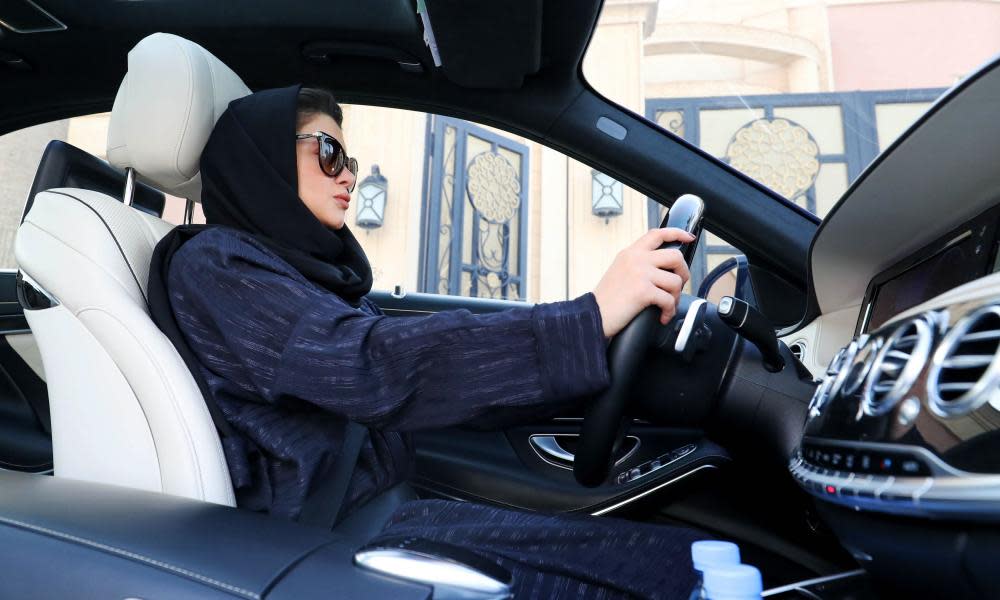Further arrests of Saudi women's rights activists in escalating crackdown

At least 10 prominent Saudi activists, mostly women’s rights campaigners, have now been reported to have been arrested in what appears to be an escalating clampdown ahead of the much-vaunted lifting of the prohibition on women driving in the kingdom on 24 June.
The arrests, with more feared by human rights campaigners, come amid a high-profile campaign in Saudi media outlets and on social media denouncing the women as “traitors”.
According to human rights organisations working outside the kingdom, most of the women were warned in September against commenting on the lifting of the ban on female drivers, a reform initiative credited to Crown Prince Mohammed bin Salman, as well as on the anti-guardianship campaign.
Saudi Arabia’s guardianship system requires women to obtain permission from their fathers, brothers, husbands or even sons for a host of life decisions.
According to the Gulf Centre for Human Rights (GCHR), among those arrested last week were Eman al-Nafjan and Loujain al-Hathloul, both well-known women’s rights activists.
The two women are among nine campaigners whose names have been circulating on social media in recent days.
According to the GCHR, al-Hathloul was being held incommunicado while al-Nafjan was able to call her family once. Both are at undisclosed locations.
Al-Nafjan, who has been heavily involved in the campaign to allow women to drive in the kingdom, is a professor and the author behind the Saudiwoman’s Weblog, a blog about Saudi society, culture, women’s rights and human rights in general.
Al-Hathloul is a Saudi women’s rights activist and a social media figure, who has been involved in the campaign for women to be allowed to drive, and was detained on 1 December 2014 for 75 days and again in June 2017.
The Saudi interior ministry has said that those detained are being investigated for communicating with “foreign entities”, working to recruit people in sensitive government positions and providing money to foreign circles with the aim of destabilising and harming the kingdom.
Saudi-American women’s activist and blogger Nora Abdulkarim, who has been posting information on Twitter about the recent arrests, said the move had created an atmosphere of fear.
“Saudi feminists are timidly returning to agitating on Twitter,” she tweeted. “Some show support for arrested activists, some not. For 1st time in anti-guardianship campaign, very intimidating to speak.”
After posting a list of nine of those detained, she added on Monday: “Unfortunately, list is already outdated. 10th arrest occurred today. This one is significant as it is first arrest we hear of new/youth #Saudi feminist activists (who became active in anti-guardianship campaign of 2016).”
According to Hiba Zayadin, of Human Rights Watch, the arrests have come amid a high-profile “smear” campaign accusing the women of disloyalty, she told the Guardian.
“We know of at least nine individuals who have been arrested whose names are circulating on social media. We believe there are nine confirmed, but we fear that there may be others who will arrested in the coming days.
“Some of those named – and others – were called in by officials in September after the announcement that the driving ban was being lifted, and told not to speak out in favour.
“So far as we know they complied, so we don’t know why this is being done. But the vicious smear campaign against them has been quite unprecedented.”
Among the media outlets that have attacked them is Okaz, which, according to Zayadin, ran a double-page spread featuring some of those arrested.
Pictures of some of the women have also appeared in social media posts, where they were accused of “contact with foreign entities with the aim of undermining the country’s stability and social fabric”.
A hashtag, #AgentsofEmbassies, and a graphic featuring the activists’ faces, also spread on social media.
Campaigners, however, remain unsure of the precise motivation for the arrests.
“There’s always been a sense that the women’s activists in Saudi are protected, that they wouldn’t be punished in the same way as other activists,” said Zayadin.
“This feels like a message that they are not beyond punishment. Why? It is not clear but one theory is that it is for taking credit away from reforms being pushed by the crown prince.
“It is still pretty surprising that this should be happening days before the driving ban is lifted. Another theory is that it may be to insulate the leadership from ultra conservatives who are unhappy about the reforms.”
Crown Prince Mohammed bin Salman, 32, is seen as the force behind the lifting of Saudi Arabia’s longstanding driving ban on women, part of a series of reforms being pushed by the powerful royal in the conservative kingdom.
The decision to allow women to drive could give them the much-needed mobility to join the workforce. Saudi women no longer need male permission to start a business.
But Saudi activists say social change will only be cosmetic without dismantling the kingdom’s guardianship system.

 Yahoo News
Yahoo News 
